Maintaining Quality Data Security Practices
Data security is important for businesses today, more than it ever was. By definition, data security is the practice of protecting digital information from unauthorised access, cyber corruption or theft.

It is a principle that encompasses every aspect of information security from the physical sense of hardware and storage devices to administrative and access controls. Also, the logical security of software applications, organizational policies, and procedures.
When implemented well, data security policies protect an organization's information possessions and resources against cybercriminal activities. They also protect against human error and any possible internal threats, which tend to be the leading causes of data breaches today.
There are a variety of tools and technologies that can enhance an organization's existing data, how it's used and how critical it is. The data security tools should be able to protect sensitive files while also adhering to regulatory requirements.
The steps to make towards better data security include multi-factor authentication, strict permissions, updating your security, encryption, and the importance of training all those that have access to it.
Read more about these below on how businesses such as Platincasino Ireland and others alike take the necessary precautions to make sure their data and those visiting their sites are kept as secure as possible.
5 Ways to Keep Consumer Data Secure
- Implement Multi-Factor Authentication
A form of digital data security includes multi-factor authentication which is a method that requires users to provide two or more verification factors to get access to a resource such as an application, an online account or even VPN software.
Instead of asking just for a username and a password, multi-factor authentication needs one or more verification factors. This helps to lessen the probability of cyber-attacks being successful. The use of multi-factor authentication is important because it strengthens and improves an organization's security by requiring users to distinguish themselves with more than just a simple username and weak passwords.
It's not uncommon for businesses to face security risks due to employee’s weak passwords or the use of the same password for multiple accounts which leaves organizations vulnerable to breaches. Having said that, multi-factor authentication helps with these challenges while also assisting employees in safely managing different accounts. This also provides organizations more control over identity management and achieving legal compliance with data regulations.
It's highly recommended to implement multi-factor authentication because it can reduce the likelihood of being attacked by a cyber-criminal.
2. Strict Permissions
Another important aspect of data protection and security is to keep the list of people who have access to it short. Permissions should remain as short and direct as possible to ensure that keeping data safe and secure is manageable.
If you think about it, access control and strict permissions are a part of everyday life in one way or another and it's an important aspect of data security for businesses. The reason being is that it controls who has access to what resources and limits those who shouldn't or don't need access to certain aspects.
Following this principle means that access to databases, networks and administrative accounts should be granted to as few people as possible and only to those who need it to get their jobs done. By doing this, users have the rights and access to the information that they need to get their jobs done without allowing access to information that they do not need. This is an important step in providing data security and managing control over who has access to what.
Additionally, this helps organizations to remain compliant with industry standards and regulations by limiting the potential risks associated with data exposure. With less access to important information by fewer people, the less likely it is that this information will be exposed through inside threats or online compromises.
3. Update your security
Another way to keep your data safe is by updating your security regularly so that you can be ahead of any threats that may come your way. Properly updating your computer is how you can ensure that your data is protected. Because hackers love a good software flaw and are always adapting their strategies to exploit weaker software versions, it is highly recommended to update applications regularly since they are only as good as their most recent update.
If a hacker manages to get through, this can infect your whole system with high chances that they can gain control over your computer and encrypt your files while stealing any data they can access. With your information, they can commit several harmful cyber-crimes, or they could sell your data on the dark web.
It's best to avoid this which is why updating your software is so important for data protection as updates usually come with what is called a 'software patch' which covers the security holes that help to keep hackers out.
As always, keep in mind that you should always have a backup of your data to ensure you don't run into any conflicts or loss of information during regular software updates.
4. Encrypt your data
To make sure that data on mobile devices is trustworthy and secure is through format encryption. This is the process through which data is encoded so that it is inaccessible to unauthorized users and helps to protect sensitive data and private information. Encryption can also improve the security of communication between servers and client apps.
Encrypting data is pretty straightforward. An algorithm is required to translate (encode) plaintext or readable data into unreadable data or what's known as ciphertext. Then, the only way to decode the text into readable text is with a corresponding decryption key from authorized users. If the encryption is effective, data should be protected and unreachable from any unauthorized access.
Although encryption is basic, it's an essential aspect of data security. Organizations must do all that they can to protect their customer's information online as well as their own. Hence, why it's becoming more and more common for technology encryption to be activated on apps and websites.
5. Make sure everyone who has access is trained
Apart from all the processes and techniques mentioned above, it's also a good idea to ensure that any employee who has access to sensitive or important data is adequately trained to maintain safe practices.
Teaching and training employees on the importance of good security measures, password dynamics, and assisting them in recognizing potential attacks can play a huge role in keeping your data safe throughout.
There are various ways that organizations can create security awareness through training programs to educate employees and users on the importance of data sensitivity and security. If employees are aware of the dangers that are out there and the importance of keeping data as secure as possible, they will assist in looking out for any potential threats while also making sure to update their software.
Therefore, educating and training employees is important as it ensures that everyone is on the same page and it helps to inform them on how to contribute to the security of data information and can phish out any potentially harmful and compromising cyber-attacks.
Conclusion
To conclude, as technology advances and more activities are being processed in the digital space, it’s becoming more and more important to keep data private and secure. There are several ways organizations can do this; some of which are easy to implement while others may take more time, resources, and focus than others.
Originally published at LoginRadius



